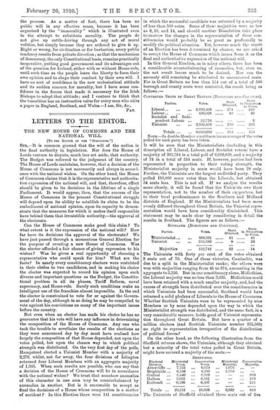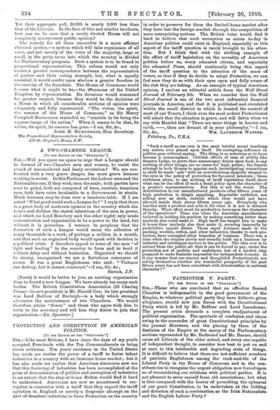LETTERS TO THE EDITOR.
THE NEW HOUSE OF COMMONS AND THE NATIONAL WILL.
[TO TEE EDITOR OF THE " SPECTATOR."'
SIR,—It is common ground that the will of the nation is the final authority in legislation. Nor does the House of Lords venture to dispute, much less set aside, that authority. The Budget was referred to the judgment of the country. The House of Lords maintains, however, that a decision of the House of Commons is not necessarily and always in accord- ance with the national wishes. On the other hand, the House of Commons claims that it is the representative and authorita- tive expression of the national will, and that, therefore, effect should be given to its decisions in the lifetime of a single Parliament. It would appear, then, that the success of the House of Commons in the present Constitutional struggle will depend upon its ability to establish its claim to be the embodiment of national opinion, upon its capacity to demon- strate that the measures for which it makes itself responsible have behind them that irresistible authority,—the approval of the electorate.
• Can the House of Commons make good this claim P To what extent is it the expression of the national will? How far have its decisions the approval of the electorate? We have just passed through a momentous General Election for the purpose of creating a new House of Commons. Was the elector afforded a fair chance of giving expression to his wishes ? Was he given a real opportunity of choosing a representative who could speak for him ? What are the facts ? In nearly every constituency electors were restricted in their choice to two candidates, and in making his choice the elector was expected to record his opinion upon such diverse and important questions as the Budget, the Constitu- tional problem in all its phases, Tariff Reform, naval supremacy, and Home-rule. Surely such conditions make an intelligent use of the franchise almost impossible. In the end the elector is constrained to vote for or against the Govern- ment of the day, although in so doing he may be compelled to vote against his convictions on many of the important issues before the country.
But even when an elector has made his choice he has no guarantee that his vote will have any influence in determining the composition of the House of Commons. Any one who took the trouble to scrutinise the results of the elections as they were announced day by day must have realised how largely the composition of that House depended, not upon the votes polled, but upon the chance way in which political strength was distributed. On the very first day of the polls, Hampstead elected a, Unionist Member with a majority of 2,279, whilst, not far away, the four divisions of Islington returned four Liberal Members with an aggregate majority of 1,34.5. When such results are possible, who can say that a decision of the House of Commons will be in accordance with the national wishes ? We trust that somehow anomalies of this character in one aroa viay be counterbalanced by anomalies in another. But is it reasonable to accept as final the decisions of a House whose composition is a matter of accident ? In this Election there were 141 constituencies in which the successful candidate was returned by a majority of less than 500 votes. Some of thes.: majorities were as low as 8, 10, and 14, and should another Dissolution take place to-morrow the changes in the representation of these con- stituencies would probably be so great as profoundly to modify the political situation. Yet, however much the result of an Election has been determined by chance, we are askcd to accept the House of Commons which issues from it as the final and authoritative expression of the national will.
In this General Election, as in many others, there has been a considerable counterbalancing of anomalies, but, even so, the net result leaves much to be desired. Nor can the anomaly still remaining be attributed to uncontested seats. For in Great Britain no less than 554 out of a total of 560 borough and county seats were contested, the result being as follows :— CONTESTED SEATS TN GREAT BRITAIN (BOROUGHS AND COUNTIES).
Parties. Votes.
2,699,408 436,028
Seat Seats
s - Proportioa
Obtained. to Votes.
274 ...... 249 40 40
Socialist and Inde- pendent Labour ...
22,776
—
2 Unionist ... ... 2,852,418 240 263
6.010,630 — 551 — 554
Totals ...
NOTE.—In double-Member constituencies an average of the votes polled for each party has been taken.
It will be seen that the Ministerialists (including in this description all Liberal, Labour, and Socialist voters) have a majority of 305,791 in a total poll of 6,010,630, and a majority of 74 in a total of 554 seats. If, however, parties had been represented in proportion to their voting strength, the Ministerialist majority in seats would have been 28 only. Further, the Unionists are the largest undivided party. They polled 150,000 more votes than the Liberals, but obtained 34 seats less. This is not all. If we analyse the results more closely, it will be found that the Union'sts owe their representation, not to the number of their Eu2porters, but to their local predominance in the Southern and Midland districts of England. If the Ministerialists had been more evenly diffused throughout Great Britain, the Unionist repre- sentation would have been considerably diminished. This statement may be made clear by considering in detail the results in Scotland. The figures are as follows :— SCOTLAND (BOROUGHS AND COUNTIES). Seats
Obtained, in Proportion to Votes.
61 42 9 28 62 14 The Unionists with forty per cent. of the votes obtained 9 seats out of 70. One of these victories, Camlachie, was due to a split in the Ministerialist ranks ; the others were won with majorities ranging from 41 to 874, amounting in the aggregate to 3,156. But in one constituency alone, Midlothian, the Liberal majority was no less than 3,635. Midlothian could have been retained with a much smaller majority, and, had the excess of strength been distributed over the constituencies in which Unionists had been successful, Scotland would have returned a solid phalanx of Liberals to the House of Commons. Whether Scottish Unionists were to be represented by nine Members or by none depended upon the way in which the Ministerialist strength was distributed, and the same fact, in a very considerable measure, holds good of Unionist representa- tion throughout Great Britain. But have a quarter of a million electors (and Scottish Unionists number 255,589) no right to representation irrespective of the distribution of political forces?
On the other hand, as the following illustration from the Sheffield returns shows, the Unionists, although they obtained but a minority of the total votes polled in Great Britain, might have secured a majority of the seats :—
SHEFFIELD.
Electoral Ministerial Conservative Ministerial Conservative
Dilrilli011.
Votes. Votes. Majority. Majority.
Attercliffe
7,755 6,079 1,676 —
Brightside
6,156 4,200 1,956 ...
Central ...
3,440 3,829 — • .. 389
Hallam
5,965 6,181
• • • 210
Ecclesall
6,196 6,407 ...
... 211 Totals ... 29,512 ... 26,696 ... 3,632 ... 816 The Unionists of Sheffield obtained three seats out of five Parties.
Votes,
Ministerialist...
388,331 Unionist 255,589 Majorities ... 132,742
Yet their aggregate poll, 26,696, is nearly 3,000 less than that of the Liberals. In the face of this and similar incidents, how can we be sure that a newly elected House will not completely misrepresent public opinion?
The remedy for all these anomalies is a more efficient electoral system,—a system which will take cognisance of all votes, and not merely of the votes of the majority, large or small, in the petty areas into which the country is divided for Parliamentary purposes. Such a system is to be found in proportional representation. This reform would not only ensure a greater correspondence between the representation of parties and their voting strength, but, what is equally essential, it would confer upon electors a greater freedom in the exercise of the franchise. The House of Commons would b -come what it ought to be,—the (P5mmons of the 'United Kingdom by representation. Its decisions would command far greater respect, because they would be the decisions of a House in which all considerable sections of opinion were adequately and fully represented. "The virtue, the spirit, the essence of the House of Commons," as Sir Henry Campbell-Bannerman reminded us, " consists in its being the express image of the nation." When it ceases to be that, its virtue, its spirit, its essence has gone.—I am, Sir, &c.,
179 St. Stephen's House, S.W.











































 Previous page
Previous page